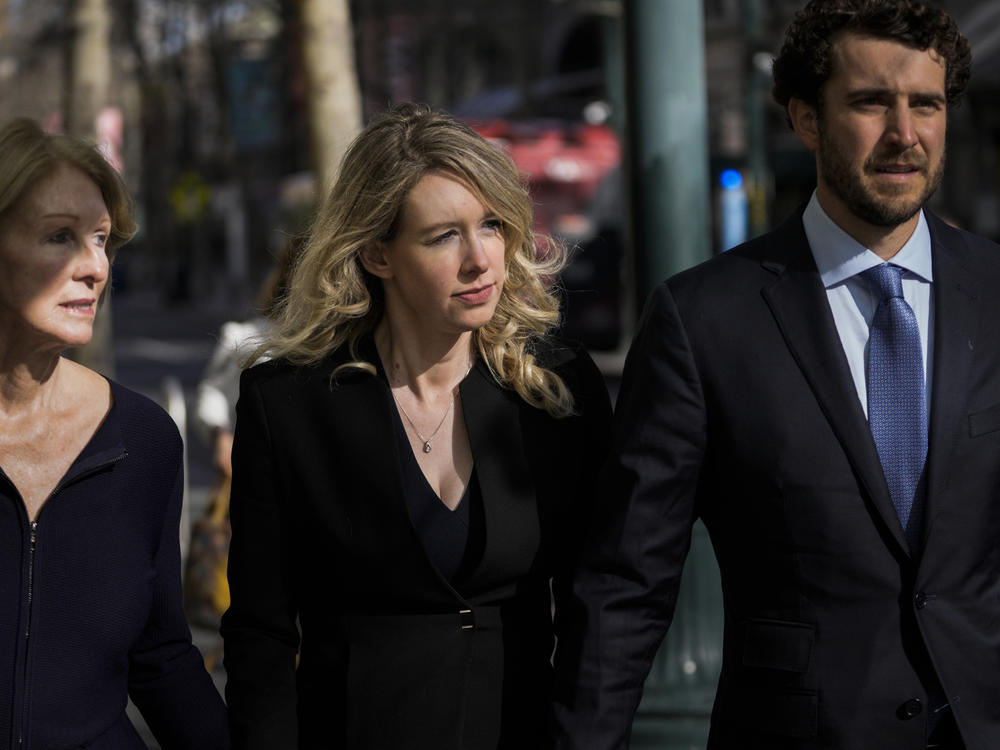Section Branding
Header Content
Judge to decide in April whether to delay prison for Theranos founder Elizabeth Holmes
Primary Content
Elizabeth Holmes, the disgraced founder of the medical technology startup Theranos, returned to court Friday to argue that she should remain free on bail while she pursues an appeal of her conviction for wire fraud and conspiracy.
Once a darling of Silicon Valley, Holmes was sentenced to 11 years in prison last year after a jury found that she defrauded investors out of more than $100 million over a blood-testing device that did not work as advertised.
At the sentencing in November, Holmes was ordered to turn herself in on April 27, a deadline widely seen as meant to accommodate the birth of her second child.
On Friday's hearing in federal court in San Jose, Calif., Holmes and her lawyers asked Judge Edward Davila to delay that deadline until her appeal is concluded, a process that could take months.
Davila said he expected to issue a ruling in early April. The judge will also consider whether Holmes should pay restitution.
Holmes, 39, founded Theranos when she was an undergraduate student at Stanford University. The company promised that its technology could screen patients for diseases with a sample from a single finger prick of blood rather than a full blood draw.
Holmes attracted nearly $1 billion in investments even as the technology did not work as claimed. Its results were often faulty, and the company frequently relied on commercially available blood analyzer machines to conduct its tests.
Eventually, a series of reports by The Wall Street Journal attracted the interest of government investigators, leading to her indictment on charges of fraud and conspiracy in 2020.
In January 2022, a jury found her guilty on three counts of wire fraud and one count of conspiracy to commit wire fraud. Her 11-year prison sentence followed in November.
Typically, once a person has been convicted of a crime and sentenced to prison, they must pursue any appeals from prison. In order to be released on bail as an appeal is ongoing, a defendant has a high bar to clear.
In general, they must convince the court they are not a flight risk and that their appeal is serious — meaning that it will raise legitimate concerns with the previous trial that could substantially change the outcome.
Holmes' lawyers argue she's not a flight risk
In court documents, Holmes' lawyers cited a variety of reasons why they said she was not a risk to flee. Among them: She has not attempted to renew her expired passport, which is currently being held by the court, and the collateral on her $500,000 bond is her parents' only home, they said.
Additionally, Holmes "is the mother of two very young children," they wrote. Both of her children were born after her indictment in 2020.
Prosecutors replied that the court had already accommodated her motherhood by setting the "generous" April deadline to turn herself in — nearly six months after her sentencing in November — because she had become pregnant after the guilty verdict.
"While facing these serious felony charges at trial and awaiting the Court's sentence, Defendant has lived on an estate with reportedly more than $13,000 in monthly expenses for upkeep and has conceived two children with her current partner," prosecutors wrote.
And they pointed to a one-way plane ticket to Mexico booked by Holmes last year that was set to depart days after a jury found her guilty.
In response, Holmes' lawyers explained that her partner had booked that ticket — "before the verdict and full of hope" that she would not be found guilty — in order to attend the wedding of close friends. The ticket was canceled after government lawyers objected, they said, adding that "Ms. Holmes has never attempted to flee."
Copyright 2023 NPR. To see more, visit https://www.npr.org.

